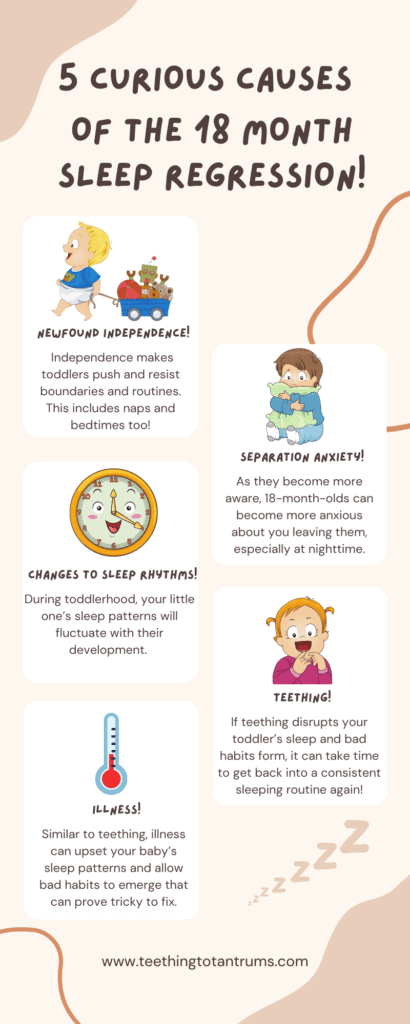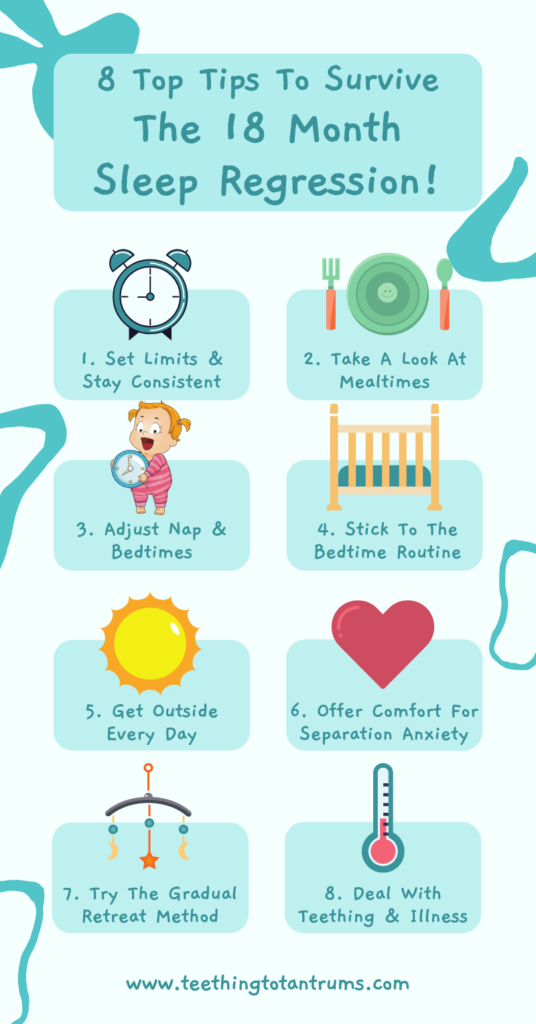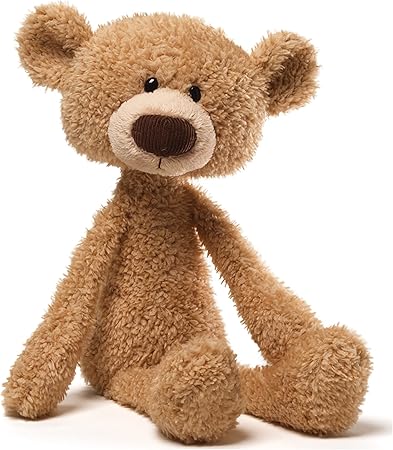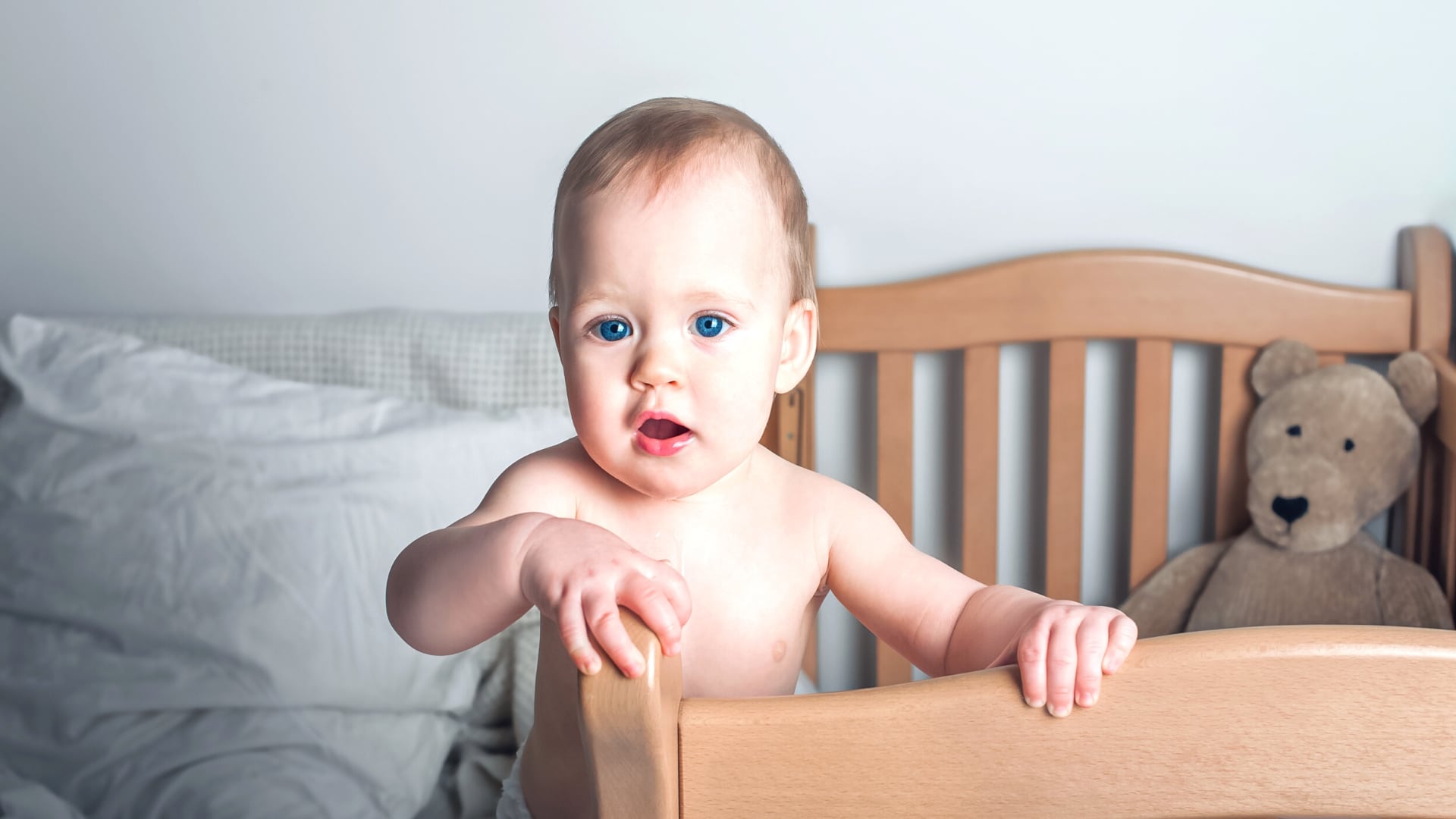Little one suddenly fighting sleep? Being fussy? Struggling to settle? The 18 month sleep regression has arrived. Here’s what that means, and what exhausted parents need to know to get through it with healthy sleep habits intact.
What Is The 18 Month Sleep Regression?
The 18 month sleep regression is a bump in your child’s sleep habits between 17 and 19 months old. Usually, children will start to resist sleep, wake up frequently, refuse naps and struggle to resettle despite having been great sleepers up until now.
How Long Does An 18 Month Sleep Regression Last?
If your child experiences it, the 18 month sleep regression can last anywhere between 2 and 6 weeks from 17 and 19 months.
18 Month Sleep Regression Signs
If you suspect your little one is experiencing an 18 month sleep regression, here are some of the signs that will confirm your suspicions:
- During the 18 month old sleep regression, there is an increase in the number of nighttime wakings,
- Your little one will struggle to fall asleep after they wake at night,
- They will resist their established bedtime routine,
- More often than not, your child’s sleep cycle will fall aside and they will require more daytime sleep due to a lack of sleep at night,
- Your little one will struggle to fall asleep when put to bed,
- And finally, your child will try to get out of bed more often (especially if they have recently transitioned to a toddler bed from a crib).
So, if you are nodding your head in agreement whilst reading this list… Then your little one is definitely experiencing a sleep regression.
Looking to get your little one to sleep quickly and effortlessly through a healthy nighttime routine? Check out my Bedtime and Nap Cheat Sheet and master the art of making daytime naps and bedtimes as seamless as possible.
A bedtime & nap cheat sheet so good your little one will ask you to put them to bed...
Laura Williams "This is a life saver! I'm so glad I downloaded your bedtime & nap cheat sheet. My little one actually asked me to put him to bed last night! Unbelievable! Thank you so much!"
Click Here For The FREE Cheat Sheet
Causes Of The 18 Month Sleep Regression
There are a variety of causes of the 18 month sleep regression. But if I had to narrow them down, these are the top 5 causes of sleep regressions that every parent should be aware of.

1. Newfound Independence
For some toddlers, their newfound independence around the 18 month mark makes them want to push boundaries and resist established routines.
Sadly for us… this includes resisting naps and bedtimes.
In addition, toddlers are loving their growing ability to interact with the world around them.
This can mean that they find it hard to wind down at the end of the day, making falling asleep quite tricky.
2. Separation Anxiety
It is also quite normal for babies of this age to experience increased separation anxiety.
As they become more aware, 18 month olds can become more anxious about you leaving them, especially at night time and this can easily trigger an 18 month sleep regression.
3. Changes In Your Toddler’s Sleep Rhythms
During toddlerhood, your little one’s sleep patterns will fluctuate with their development.
This means that on some days your 18 month old may need to go to bed a little later and wake up later. Or they’ll need to go to bed sooner and wake up earlier.
They may even start transitioning from 2 short naps to 1 long one too.
This is a natural part of growing up and you will have to make these sleep adjustments as your toddler grows.
However, if not managed properly, your toddler can easily fall into the 18 month old sleep regression.
NOTE: Motor skills are developing at a rapid rate at this age and can easily trigger restless settling and nighttime awakenings as your toddler becomes overtired or is simply keen to practise their new skills.
4. Teething
Teething can easily cause a sleep disturbance for your toddler and these disrupting effects can last far longer than the teething itself.
If teething disrupts your toddler’s sleep for a short while, bad habits can form and it can take time to get back into a healthy, consistent sleeping routine again.
TOP TIP: The first molars and canine teeth begin to erupt at this age, which can be very painful for your little one. As a result, particularly at sleep times, children who are teething often want more comfort from their parents.
5. Illness
Similar to teething, illness can also upset your baby’s established sleep patterns and these sleepless nights often result in children using sleep crutches that can prove tricky to fix once the illness is over.
When your baby is ill (like an ear infection) you will naturally spend more time holding them and rocking them to sleep.
However, once the illness has passed…
Your little one will not want to go back to normal just yet.
Therefore, you will have to wean them off the extra support and hours of sleep you have been giving them and teach them appropriate sleep routines once again.
How Can You Survive A 18 Month Sleep Regression?
The 18 month sleep regression is tough, there is no question about that. However, there are things you can do to help you and your child get through this phase and come out the other side with your healthy sleep habits intact.

1. Set Limits And Stay Consistent
As your toddler becomes more independent, they will need you to set some consistent boundaries in order to help them feel better able to cope.
Realising they are capable of doing so many new things can be very overwhelming for a child.
So, make sure you have a consistent sleep schedule in place during the day to help your toddler learn how to respond to established routines for naps and bedtimes.
NOTE: At 18 months of age, your child should be having around 11 to 14 hours of sleep in a 24 hour period.
2. Take A Look At Mealtimes
As your toddler becomes more active around 18 months of age, they may have an increase in appetite.
This could mean that you need to make sure they have enough to eat before bedtime to avoid them waking at night due to hunger.
Try offering a healthy pre-bedtime snack such as apple slices, peanut butter, or some yoghurt before bed to help them sleep through the night.
PS: The wonderful Edwena at My Little Eater has some great Toddler Bedtime Snacks to try, so be sure to check her out too.
3. Adjust Nap Times And Bedtimes
This can be a tricky phase when it comes to naps and you might be tempted to drop naps in the hope that your toddler will be more tired for bed and sleep better at night.
However, as I say over and over, less daytime sleep does NOT mean better nighttime sleep.
In fact, the complete opposite happens.
An overtired toddler is not going to go to bed peacefully or quietly.
Their bodies will be stressed and full of adrenaline…
And this is not ideal when getting ready for bed because your little one will be hyper instead.
If your toddler is transitioning from 2 naps to 1, you need to make sure that their nap is taken at a consistent time each day (preferably after lunch) and that they have had an adequately active morning to be ready for sleep.
REMEMBER: Your child should not be in bed any later than 8pm to ensure your toddler gets enough sleep to support healthy brain development and growth as well as physical development.
A bedtime & nap cheat sheet so good your little one will ask you to put them to bed...
Laura Williams "This is a life saver! I'm so glad I downloaded your bedtime & nap cheat sheet. My little one actually asked me to put him to bed last night! Unbelievable! Thank you so much!"
Click Here For The FREE Cheat Sheet
4. Stick To Your Consistent Bedtime Routine
I know that I am always going on about the bedtime routine, but having one at 18 months old is vitally important to help you all survive a sleep regression.
Having a calm and consistent evening routine for your toddler will not necessarily stop a sleep regression…
But it will prepare your toddler for sleep and give them clear cues that bedtime is coming up and that it is a non-negotiable.
5. Get Outside Every Day
Getting outside every day is also incredibly important for your toddler’s circadian rhythm and will definitely help them sleep better and reduce the impact of the 18 month old sleep regression.
Fresh air and natural light during awake times are crucial for healthy sleep and it has been proven that spending time outdoors each day benefits toddler sleep.
TOP TIP: Avoid excess screen time, especially before bed, as this will interfere with your toddler’s melatonin levels which are naturally regulated by their circadian rhythm.
6. Offer Comfort For Separation Anxiety
As I mentioned earlier, separation anxiety is a big trigger for the 18 month sleep regression. So to survive a sleep regression linked to separation anxiety, you will need to offer comfort and coping techniques such as:
- Offer them a favourite stuffed toy to sleep with.
- Try an audiobook or music to lull them to sleep.
- Use a dim night light.
- Don’t immediately go to your toddler when they wake at night, but rather give them the opportunity to self-settle.
- Practice separation during the day by encouraging independent play or spending time with another family member without you.
- Avoid picking your toddler up straight away when they wake up. Instead, offer comfort and reassurance while they are lying down by using your voice.
- Keep the bedtime routine calm and comforting with plenty of cuddle time before leaving them to sleep.
Finding the right night light for your child can be quite a task. You want something safe, comforting, and practical. The Cozy Starry Night Light ticks these boxes, with eye-friendly warm lighting and an easy-to-use dimmer.
Its gentle glow makes it the best night light for feeding baby, diaper changes, or comforting your little one back to sleep.
As your baby grows the Cozy Starry Night Light's starry sky projection can provide comfort and gentle quiet time stimulation. Its soft lighting ensures a dreamy, peaceful environment, supporting your baby’s natural sleep cycle.
It really is a fantastic nightlight (at a very reasonable price!)
- Eye-friendly warm lighting with adjustable brightness.
- Includes a timer function for convenience.
- Projects a starry sky that is soothing for little ones.
- Rechargeable battery, so it's very portable.
- A USB adapter is not included for charging.
- The star projector is static without motion (however, this is ideal for very young babies and toddlers).
- Battery life varies based on the brightness settings.
7. Try The ‘Gradual Retreat’ Method Of Sleep Training
The Gradual Retreat is one of my preferred sleep training strategies because it addresses your toddler’s separation anxiety and allows you to make sure they stay in bed.
You can start by sitting next to their bed but not touching them. Then, each night after, move further and further away until you are outside the bedroom using only your voice as comfort; keeping communication to a minimum.
8. Dealing With Teething And Illness
If your toddler is teething or unwell and having trouble staying asleep at night… there are things you can do to offer comfort and pain relief.
For teething pain:
- Massage their gums with a cool damp cloth,
- Give them a teething toy
- Offer something cooling to suck on
- And give lots of cuddles.
For illness, give lots of cuddles and comfort with cuddly toys too and follow advice from your doctor. The priority right now is making sure baby is healthy and safe.
Super soft, very cuddly and the perfect companion to young children, the GUND Teddy Bears never fail to be toy box favourites for years to come!
Looking After Yourself During A Sleep Regression
As parents, we often forget to look after ourselves. Our children are our priority, and everything else falls into second place.
However, insufficient sleep will undoubtedly make us short-tempered and cranky… And at the best of times, looking after a toddler requires lots of energy and patience.
So to help yourself through the 18 month old sleep regression remember to:
- Enlist some help if you are able, by getting your partner to share the evening routine and help to deal with night wakings.
- Take a break during the day to avoid parenting burnout. Leave your toddler in the care of a trusted friend or family member for a couple of hours and do something for yourself.
- Make time for small moments that bring you joy. Enjoy that cup of fancy coffee, take a short 10-minute walk around the block, savour that piece of chocolate and plan a bubble bath in the evening.
Above all, remember: You Are Human.
Don’t be too harsh on yourself if you are struggling or feeling irritated. Sleep disruption and parenting go hand in hand…
But you can navigate these sleep regressions if you stick to established routines, understand what is going on in your toddler’s development and hold on to the fact that this is just a phase that will pass if handled correctly.
Frequently Asked Questions About The 18 Month Sleep Regression
Here are a few frequently asked questions that always pop up when talking about the 18 month old sleep regression.
Do All Children Go Through An 18 Month Sleep Regression?
No, not every child will experience an 18 month sleep regression.
As with all sleep issues, some children will experience them and some won’t. And although we put labels on certain ages as being more prone to a regression than others, they can occur at any time for any number of reasons.
Will Sleep Regressions Ruin Your Sleep Training Plans?
Yes and no… All toddler sleep regressions put sleep training under pressure.
However, sticking to a structured sleep plan will definitely help you get through the regression quickly with bedtime routines and self-settling intact.
When To Seek Help From A Doctor About The 18 Month Sleep Regression
If your toddler is still struggling with sleep issues after a couple of months despite your best efforts to get things back on track, you should talk to a sleep consultant or doctor to rule out any underlying health issues.
TOP TIP: It’s a good idea to keep a journal of baby’s sleep times, just in case.
Need More Parenting Help?
- Download our FREE Bedtime & Nap Sleep Cheat Sheet. It’s a free, easy-to-use and proven formula designed for parents of 0-5 year olds to master the art of consistently undisturbed and restful sleep without the yelling, nagging or exhausting long-winded evenings.
- Check out our Parenting Toolbox. You’ll get access to expertly-chosen products that you can guarantee are the best for your little one and your wallet.
- Are you looking for personalized guidance to navigate the challenges of parenting? I offer 1-on-1 consultations to bring you tailored strategies and actionable advice to help support your child's growth and well-being with confidence.

A bedtime & nap cheat sheet so good your little one will ask you to put them to bed...
Laura Williams "This is a life saver! I'm so glad I downloaded your bedtime & nap cheat sheet. My little one actually asked me to put him to bed last night! Unbelievable! Thank you so much!"
Click Here For The FREE Cheat Sheet




